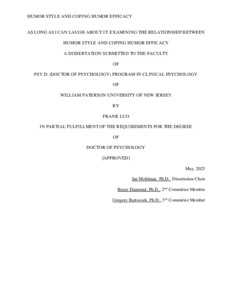Please use this identifier to cite or link to this item:
http://hdl.handle.net/20.500.12164/3321| Title: | As Long As I Can Laugh About It: Examining the Relationship Between Humor Style and Coping Humor Efficacy |
| Authors: | Luo, Frank Y. |
| Keywords: | Psychology;Social psychology;Anxiety;Coping appraisal;Coping humor;Humor production;Humor style;Maladaptive |
| Issue Date: | May-2023 |
| Publisher: | William Paterson University |
| Abstract: | Assessment of coping has largely viewed the role of humor as both adaptive and effective. However, depending on an individual’s humor style, there is the potential for humor production to lead to cognitive appraisals deleterious to psychological well-being. The present study examined how emotion-focused coping efficacy and appraisals vary by humor style in a sample of 232 undergraduate students. Participants underwent a false-feedback paradigm designed to induce stress before completing either a cartoon caption-writing task or a control condition, which involved writing descriptions of the same cartoon vignettes. Anxiety was assessed before and after each caption-writing task. Finally, participants reported on their humor styles and emotion-focused coping appraisals. It was hypothesized that the humor production group would experience a greater reduction in state anxiety following a caption-writing task than the control group. Additionally, a negative relation of self-defeating humor and anxiety reduction and coping efficacy following the caption writing task was hypothesized. On the other hand, the use of self-enhancing humor was predicted to have a positive relation with anxiety reduction and coping efficacy following the caption writing task. Findings revealed that producing humorous content was not related to changes in anxiety anxiety. However, humor styles predicted both anxiety relief and emotion-focused coping appraisal. Anxiety relief was positively related to affiliative humor and inversely related to self-defeating humor, while emotion-focused coping appraisal was positively related to self-enhancing humor and inversely related to both self-defeating humor and aggressive humor. These findings support previous literature that suggests self-defeating humor is unambiguously maladaptive and highlight the importance of both public and clinician awareness of how humor is used in treatment. |
| URI: | http://hdl.handle.net/20.500.12164/3321 |
| Appears in Collections: | Theses & Dissertations |
Files in This Item:
| File | Description | Size | Format | |
|---|---|---|---|---|
| Luo_HumorStyle.pdf | 346.87 kB | Adobe PDF |  View/Open |
Items in DSpace are protected by copyright, with all rights reserved, unless otherwise indicated.
